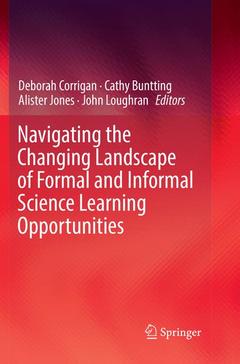Description
Navigating the Changing Landscape of Formal and Informal Science Learning Opportunities, Softcover reprint of the original 1st ed. 2018
Coordinators: Corrigan Deborah, Buntting Cathy, Jones Alister, Loughran John
Language: English
Subjects for Navigating the Changing Landscape of Formal and Informal...:
Keywords
contemporary science education; formal and informal science education; science in school curriculum; student engagement with science; future science; science teachers and learning; teaching science; science education; communicating science; primary school science; science learning and teaching; Socio-scientific issues; school science; student participation; science concepts; student motivation; relevant science learning; science learning environments; learning and instruction
Publication date: 12-2018
Support: Print on demand
Publication date: 07-2018
Support: Print on demand
Description
/li>Contents
/li>Biography
/li>Comment
/li>
This book presents research involving learning opportunities that are afforded to learners of science when the focus is on linking the formal and informal science education sectors. It uses the metaphor of a "landscape" as it emphasises how the authors see the possible movement within a landscape that is inclusive of formal, informal and free-choice opportunities. The book explores opportunities to change formal school science education via perspectives and achievements from the informal and free-choice science education sector within the wider lifelong, life-wide education landscape. Additionally it explores how science learning that occurs in a more inclusive landscape can demonstrate the potential power of these opportunities to address issues of relevance and engagement that currently plague the learning of science in school settings.
Combining specific contexts, case studies and more general examples, the book examines the science learning landscapes by means of the lens of an ecosystem and the case of the Synergies longitudinal research project. It explores the relationships between school and museum, and relates the lessons learned through encounters with a narwhal. It discusses science communication, school-community partnerships, socioscientific issues, outreach education, digital platforms and the notion of a learning ecology.
Cathy Buntting is a Senior Research Fellow at the University of Waikato, New Zealand. She has a Masters degree in biochemistry and a PhD in science education, and is Director of the Science Learning Hub, a significant online portal linking the science and education sectors. Recent research projects have included the development of students’ futures thinking and the role of ICTs in transforming science learning and teaching.
Deborah Corrigan is a Professor in science education and Deputy Dean of the Faculty of Education at Monash University. After working as a chemistry and biology teacher, she worked at Monash University in chemistry and science education, particularly in teacher preparation. Her research interests include industry and technology links with science, curriculum design, science and STEM education policy and the values that underpin science education. However, her main research interest remains improving the quality of chemistry and science education so that it is relevant to students.
Alister Jones is a Research Professor and Senior Deputy Vice-Chancellor of the University of Waikato, New Zealand. He is Director of the New Zealand Science and Biotechnology Learning Hubs, as well as the Director for a number of companies. He has been consulted on educational development in New Zealand, Australia, the UK, USA, Hong Kong, Chile and Thailand. His research interests span technology and science education, teacher education, curriculum, assessment and educational leadership.
John Loughran is the Foundation Chair in Curriculum & Pedagogy and Dean of the Faculty of Education, Monash University. John was a science teacher for ten years before moving into teacher education. His research interests include the fields of teacher education and science education. John was the co-founding editor of Studying Teacher Education and is an Executive Editor for Teach
These books may interest you

Contexts for Music Learning and ParticipationDeveloping and Sustaining Musical Possible Selves 126.59 €



